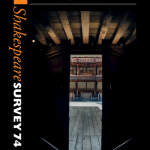“Teaching Shakespeare in a Time of Hate” by Alexa Alice Joubin and Lisa S. Starks
T he time of hate in which we live dictates that we answer fully and collaboratively the challenges of all forms of violence, including racism, antisemitism, misogyny, transphobia and other types of bigotry. It is important to bring our academic work to build more equitable, sustainable communities, rather than exploiting trendy topics that service academic advancement and not students and community members. One of the core values of the humanities lies in understanding the human condition in different contexts, and Shakespeare’s oeuvre as a cluster of complex, transhistorical cultural texts provides fertile ground to build empathy and critical thinking.
he time of hate in which we live dictates that we answer fully and collaboratively the challenges of all forms of violence, including racism, antisemitism, misogyny, transphobia and other types of bigotry. It is important to bring our academic work to build more equitable, sustainable communities, rather than exploiting trendy topics that service academic advancement and not students and community members. One of the core values of the humanities lies in understanding the human condition in different contexts, and Shakespeare’s oeuvre as a cluster of complex, transhistorical cultural texts provides fertile ground to build empathy and critical thinking.
Co-authored by Alexa Alice Joubin and Lisa S. Starks, this article examines new theories and praxis of listening for silenced voices and of telling compelling stories that make us human. Elucidation of our Levinas-inspired theories of the Other is followed by a discussion of classroom practices for in-person and remote instruction that foster collaborative knowledge building and intersectional pedagogy.
The new normal in higher education, which is emerging at the time of writing, exposes inequities that were previously veiled by on-campus life and resources. Even as they are cause for grief and anxiety, the inequities exposed by COVID-19 can spur change for the better.
A number of analogue and digital pedagogical tools could promote radical listening – proactive communication strategies to listen for the roots of stories that allow for ‘an egality between teller and listener that gives voice to the tale’. Students learn to listen for motives behind stories, rather than the plot of the narrative. As a cluster of complex texts that sustains both past practices and contemporary interpretive conventions, Shakespeare provides fertile ground for training in radical listening. Specifically, radical listening draws on the methodology of strategic presentism.
Coined by Lynn Fendler, strategic presentism acknowledges the present position of the interpreters of the humanities and empowers them to make a difference by methodically using our contemporary issues to motivate historical studies. By thinking critically ‘about the past in the present’ – as does the #BlackLivesMatter movement – students analyse performances and dramatic texts with an eye towards changing the present. In this framework, the past is not an object of obfuscatory, irrelevant knowledge that is sealed off from our present moment of globalization, but rather one of many complex texts to enable us to rethink the present.
We can use this strategy to teach against transphobia. Over the past decades, prominent films and theatre works have fostered new public conversations about gender politics in Shakespeare around the world. Shakespeare’s plays appeal to diverse audiences even though they were initially performed by all-male casts. Many modern adaptations on stage and on screen reimagine those plays as expressions of gender nonconformity.
The classroom environment is an ideal place to begin this work against hate because transfeminism calls into question the transphobia and transmisogyny that, unfortunately, often surfaces in our institutions of higher learning in particular, as well as in our culture in general.
One exercise might focus on representations of trans people in both popular culture and Shakespearian performances on stage and screen. Television shows, films, documentaries and other media often foreground scenes or photos with news stories that feature trans individuals dressing and undressing, as well as rehearsing their walk, talk and gestures to appear as their ‘new’ gender, as if they are putting on an artificial gender with their costumes, accessories and mimed behaviour.
For the exercise, students would examine popular-culture examples of the representations described above, paired with comparable scenes from Shakespeare film or filmed stage productions. Showing popular-culture examples first can help students to enter into the discussion more freely and openly, without the stress of responding appropriately to the Shakespeare text. When they then view the Shakespeare examples, they can see that many of the same decisions, options and demands exist for these productions as for the others. After the viewings, students could then engage in an active discussion about both, making connections between them and their readings on trans theory and Shakespeare.
In closing, we would like to note that diversity in higher education is distinct from advocacy journalism, which means we have to work actively against any ineffectual default to political correctness. When implemented unilaterally as a one-size-fits-all imposition, some gestures of inclusion risk becoming empty rituals. For example, having students self-identify their personal pronouns can be counterproductive; some feel uncomfortable with public confessions, while others may change their pronouns depending on context or over time. Education is only reparative when it is designed from the ground up to be truly inclusive, rather than being a mindless replica of evolving political correctness. Independent facility with complex cultural texts enables everyone to pierce the dense, euphemistic cloud of diversity categories that tokenize individuals and fictional characters based on any given identity marker.
This is an excerpt from Alexa Alice Joubin and Lisa S. Starks’ “Teaching Shakespeare in a Time of Hate,” Shakespeare Survey 74 (2021): 15-20. The essay was selected as the featured open-access article by Cambridge University Press. It is also available in PDF format.




